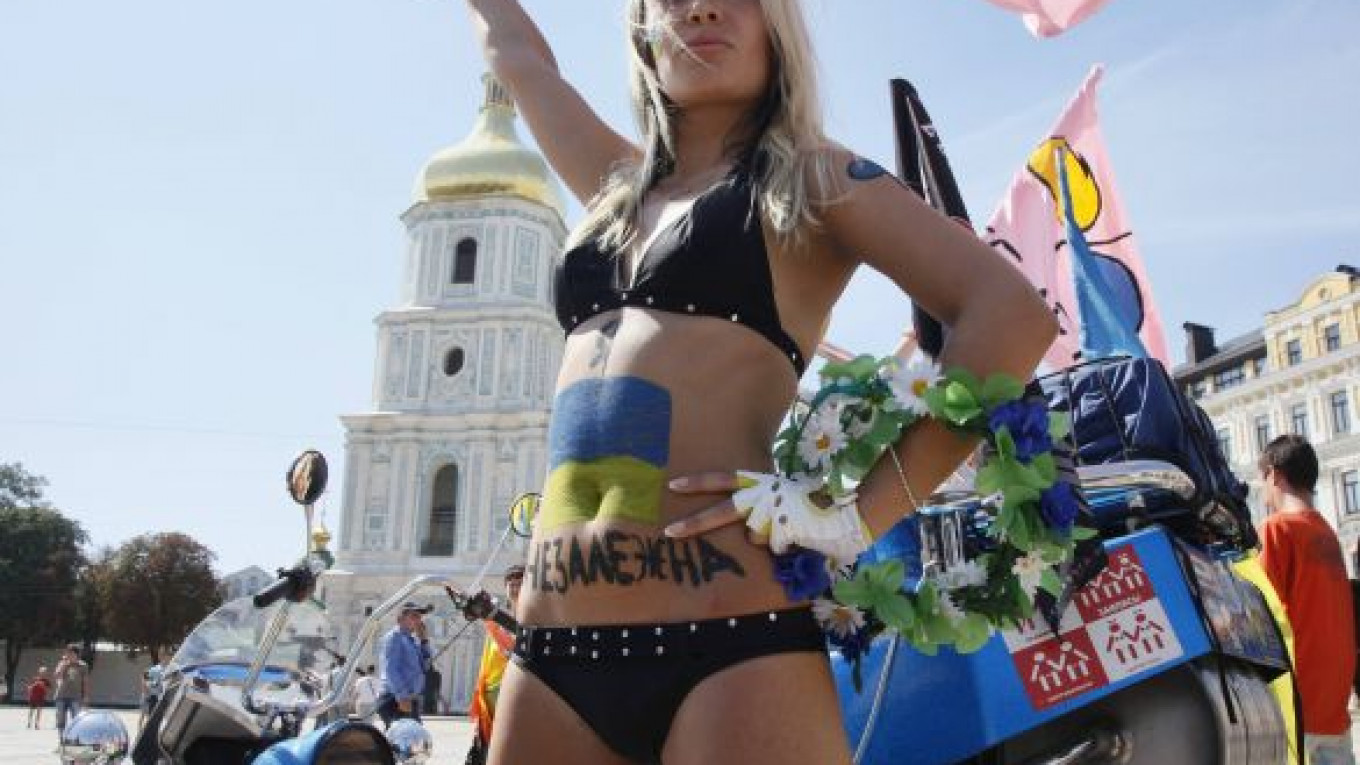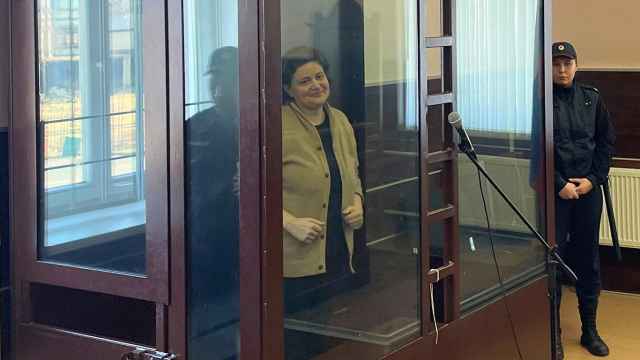KIEV — How to protest domestic violence, corruption and a visit by Prime Minister Vladimir Putin? Femen's answer: Take off your bra!
A group of young activists is gaining popularity here for staging topless protests that involve sexually charged gestures, obscene slogans and scuffles with security guards and police. Often, the point seems to be just getting naked.
The activists, slender, long-legged beauties with traditional Ukrainian flower wreaths in their hair, say they are promoting women's rights and fighting for democracy, but some critics say they're just seeking fame and undermining the feminist cause.
"If sexuality is used to sell cars and cookies, why not use it for social and political projects," said Anna Hutsul, 26, the chain-smoking leader of Femen who has closely cropped red hair. "Sometimes you need to show your breasts for ideological reasons."
It's perhaps no coincidence that Femen originated in Ukraine, where the 2004 Orange Revolution ushered in chaotic democracy and made noisy street protests something of a national sport.
Born out of a girls' pajama party two years ago, the group has turned into a popular movement whose escapades are the subject of evening news, talk shows and blog gossip. They've become so popular, in fact, that Hutsul plans to launch a political party and run for parliament.
The group campaigns against prostitution and discrimination of women but also weighs in on a wide range of hot topics in Ukraine such as the tax code, freedom of speech and foreign borrowings by the government.
Sometimes, it seems, they are merely looking for a pretext. "We don't really care, we just want to show our boobs," says the group's blog about one protest.
Femen started out somewhat shyly, at least by the group's standards today. In summer 2008, activists wearing skimpy bikinis dove into a fountain in downtown Kiev to protest the shortages of water in student dormitories. Then, one by one, activists started bearing their chests at rallies. Today all of their protesters are topless — something, Hutsul insists, is different from public nudity, which is banned under Ukrainian law as "hooliganism."
The distinction is often lost on police, who routinely fine and briefly detain the activists for bearing their breasts in public.
The group came to the spotlight this year when they flashed their boobs in front of scores of photo and television cameras at a polling station where future President Viktor Yanukovych was expected to cast his ballot in presidential elections. They shouted, "Stop raping the country."
Femen sabotaged Ukraine's top fashion show last month when two bare-chested activists climbed on the runway holding posters that read, "The Runway is a Meat Shop" and "Model, don't go to Brothel." Some in the audience were confused by the combination of bare chests and chants against treating women as sex objects.
"The way we present our message and the message itself — they contradict each other," agreed Hutsul, an economist by training and a former show business manager who moved to Kiev from a provincial city in western Ukraine. Hutsul herself does not take part in topless protests in order to have a "serious person" representing Femen in official institutions and on talk shows.
The group caused a minor diplomatic scandal in late October when five activists undressed near the statue of Bolshevik leader Vladimir Lenin and urged Putin to stop interfering in Ukrainian politics.
"Ukraine is not Alina," read one of their banners, a reference to media speculation that Putin was romantically involved with former champion gymnast Alina Kabayeva, which he denies.
Other posters made unflattering remarks about his physical appearance. The protest eventually earned two members a night in jail.
Women's rights activists say a strong and vocal women's movement is needed in Ukraine, where civil society and feminism were virtually nonexistent in the Soviet times.
Larysa Kobelianska, head of a United Nations-led women's rights program, said women make up only 8.5 percent of the Ukrainian parliament compared with an average of 30 percent in Europe.
Prime Minister Mykola Azarov named an all-male Cabinet this year, saying "conducting reforms is not a woman's business." On average, women here earn 30 percent less then men occupying similar posts, and only 2 percent of large companies are headed by women, Kobelianska said.
She described Femen as "radical feminists" and said the group has succeeded in attracting public attention to women's problems, even if by questionable means.
The group's top activist, Inna Shevchenko, 20, insists that she can be both a feminist and a sex bomb.
"We have our body, our beauty, our sexuality, and we can combine it with brains, with ambitions, with achieving our goals, serious goals," said the tall blonde, a journalism major at a leading Ukrainian university, who was detained after the anti-Putin protest. "We should not be hiding our bodies. I have both a body and ambitions. Take me for what I am!"
The group comprises some 20 topless activists, 300 fully clothed members and thousands of online activists throughout the country, Hutsul said. Their financial sponsors and fans include a German disc jockey, a U.S. businessman in Kiev and an elderly retiree in a faraway village who vowed to campaign for the group among his neighbors.
A recent idea to sell "boobographs" — imprints of the activists' breasts, one blue and one yellow, representing the colors of the Ukrainian flag — has drawn even more fans and helped raise funds for the group. One such souvenir from a new member of the group is sold for $50, while a poster from veteran activists costs $100.
Some Ukrainians complain, however, that Femen protests can become outright tasteless, such as when activist Oksana Shachko took off her jacket, pulled down her pants and squatted in the center of the capital holding a sign reading "I Want to Pee" to protest the shortage of public toilets in Kiev.
Others say some of Femen's escapades are meaningless, such as when Shevchenko clad in nothing but black panties, stockings, suspenders and a helmet disturbed a respected women's rights conference. The argument was that the experts talk too much and do too little.
"Your clothes, dressing, undressing — it should not be about that," said Anna Dubrovina, 31, a manager at a telecommunications company in Kiev. "It should be about what you do, about your achievements."
A Message from The Moscow Times:
Dear readers,
We are facing unprecedented challenges. Russia's Prosecutor General's Office has designated The Moscow Times as an "undesirable" organization, criminalizing our work and putting our staff at risk of prosecution. This follows our earlier unjust labeling as a "foreign agent."
These actions are direct attempts to silence independent journalism in Russia. The authorities claim our work "discredits the decisions of the Russian leadership." We see things differently: we strive to provide accurate, unbiased reporting on Russia.
We, the journalists of The Moscow Times, refuse to be silenced. But to continue our work, we need your help.
Your support, no matter how small, makes a world of difference. If you can, please support us monthly starting from just $2. It's quick to set up, and every contribution makes a significant impact.
By supporting The Moscow Times, you're defending open, independent journalism in the face of repression. Thank you for standing with us.
Remind me later.






